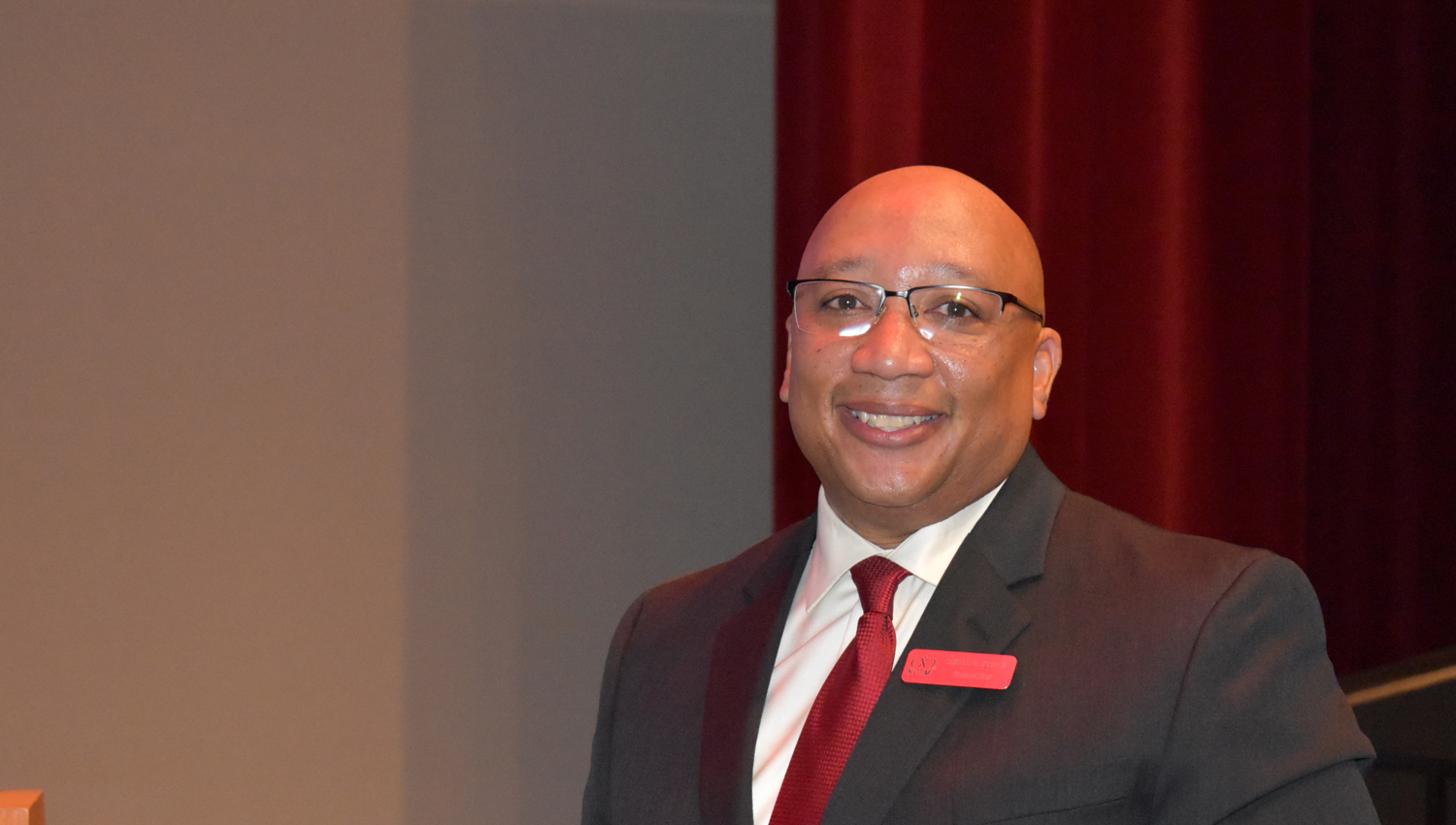Robert Q. Berry: Think of Math as a Social Endeavor

If Robert Q. Berry, the president-elect of the National Council on Teaching Mathematics, walks down the street and someone calls out “Robbie!,” he knows, without even looking, that the person knows him from long ago. If the person calls out “Dr. Berry,” he know it’s probably a student or a colleague familiar with his work as an associate professor of education at the University of Virginia. And how he responds to the two people will be different; he’ll use a different vernacular with each, for example.
“Just using my name two different ways elicits a certain behavior,” Berry said in his keynote address at the NC State Triangle High Five Math Summit Aug. 2-3 when over 900 elementary and secondary school teachers in the Chapel Hill-Carrboro, Durham, Johnston, Orange and Wake public schools came together for professional development around the theme Reaching All Students: Culturally Responsive Instruction.
So imagine what that means for students and teachers in a classroom, he added. “In the same way, with children, there are contextual factors that elicit certain behaviors.”
If students think of themselves as being smart, they will engage in behaviors that smart people do (like do their homework). And if they think they are doers of mathematics, they will do those behaviors they perceive that doers of mathematics will do (like volunteer to solve math problems on the whiteboard).
“Teachers are not just teachers; they are identity builders,” Berry said. “We have to be purposeful and thoughtful about how we represent student thinking and how students perceive others’ thinking.”
“Teachers have to create a common space for learning,” he added, “so students can create that competency where all believe they can be smart and doers of mathematics.”
The teachers attending the Math Summit explored how to create that space during breakout sessions after Berry’s keynote address each day.
Elementary school teachers attended the summit that Tuesday and participated in nearly 40 sessions specific for them, while middle and high school students attended the summit that Wednesday and selected from a new set of nearly 40 sessions. All sessions connected to the summit’s theme of how to reach all students, and teachers and practitioners led them. Topics included Using Tasks and Discourse to Position Every Learner as Mathematically Competent, Improving Educational Outcomes of Males of Colors, and Moving from “I’m Not Good at Math” to “I Love Math.”
The purpose was to promote equity and excellence in math education and to provide teachers with an opportunity to engage professionally to develop their craft, share ideas and get excited for the new academic year, said Kelley Johnson, executive director of secondary education at Johnston County Schools and one of the summit’s planning committee members. The summit is also “a vehicle for teacher leadership,” she added.
SAS originated the summit several years ago in partnership with the Triangle High Five, a regional consortium of the Chapel Hill-Carrboro, Durham, Johnston, Orange and Wake county public schools. This was the first year that the summit was held at NC State.
“We focused on equity so we will help teachers understand the problems with identifying students as ‘gifted’ or ‘weak’ at a young age and how these assumptions about student ability affect students differentially,” said Valerie Faulkner, a teaching assistant professor of mathematics education at the NC State College of Education. “The whole conference was also designed to uplift teachers and challenge them to constantly ‘up their game’.”
Challenge them Berry did. “Think of math as a social endeavor,” he said.
Present rich tasks that involve thinking and problem solving. Engage students in meaningful discourse. Support productive struggles in learning. Raise the status of everyone and value everyone’s thinking. Create structures in the classroom that students are willing to participate in. Value every student, and value everything that a student presents. Even if an answer is wrong, the answer may not be entirely wrong, and it will move learning forward.
Do all of that by engaging in cultural practice inquiry, he said. Get to know the students, and create tasks grounded in rich social interactions. “Teaching and learning is a social activity.”
Understanding that is important because identity and agency are highly connected.
“Agency is identity in action. If I think of myself as a smart person, I engage in behaviors that I perceive smart people do,” he said. “So how do we help create and support positive identity that elicit the kinds of behaviors associated with those who are mathematical and cultural competent?
“That’s the challenge we face not just as teachers but as parents and as people.”
What a Few Teachers Said About the Summit
Super pumped to present tomorrow with @Rice_Math at my alma mater @NCStateCED ??➡️??? #ncsumathsummit2017 #neverstoplearning #classof09 pic.twitter.com/ZYTa3Ej5cI
— Ms. Long (@MsLong_DDMS) August 2, 2017
“All kids can notice.” Create a buzz, inspire participation. Change mindsets. #MathSummit @robertqberry
— TJ Parrish (@TJParrish28) August 2, 2017
Learned a new strategy Rough Draft Talk! Can’t wait to use in math this year! @robertqberry #MathSummit pic.twitter.com/AOV5ZAWeJV
— Kim Collins (@kimmykcollins) August 2, 2017
- Categories:


